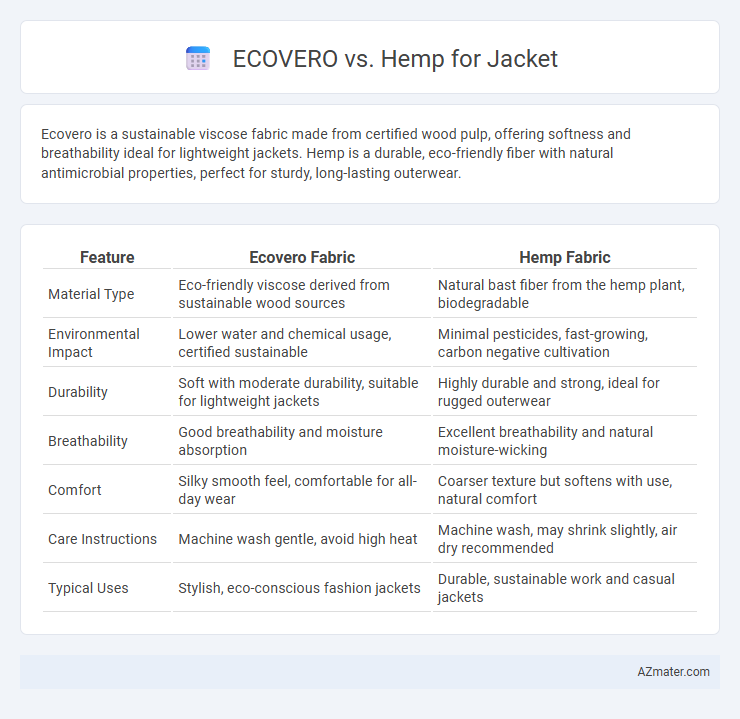Ecovero is a sustainable viscose fabric made from certified wood pulp, offering softness and breathability ideal for lightweight jackets. Hemp is a durable, eco-friendly fiber with natural antimicrobial properties, perfect for sturdy, long-lasting outerwear.
Table of Comparison
| Feature | Ecovero Fabric | Hemp Fabric |
|---|---|---|
| Material Type | Eco-friendly viscose derived from sustainable wood sources | Natural bast fiber from the hemp plant, biodegradable |
| Environmental Impact | Lower water and chemical usage, certified sustainable | Minimal pesticides, fast-growing, carbon negative cultivation |
| Durability | Soft with moderate durability, suitable for lightweight jackets | Highly durable and strong, ideal for rugged outerwear |
| Breathability | Good breathability and moisture absorption | Excellent breathability and natural moisture-wicking |
| Comfort | Silky smooth feel, comfortable for all-day wear | Coarser texture but softens with use, natural comfort |
| Care Instructions | Machine wash gentle, avoid high heat | Machine wash, may shrink slightly, air dry recommended |
| Typical Uses | Stylish, eco-conscious fashion jackets | Durable, sustainable work and casual jackets |
Introduction: Ecovero vs Hemp for Jackets
Ecovero is a sustainable fabric made from certified renewable wood pulp, known for its softness, breathability, and eco-friendly production process, making it a popular choice for ethical fashion jackets. Hemp fiber, derived from the Cannabis sativa plant, offers high durability, natural antimicrobial properties, and excellent moisture-wicking, providing a rugged yet sustainable option for outerwear. Comparing Ecovero and hemp for jackets involves assessing factors such as environmental impact, texture, durability, and comfort to determine the best eco-conscious material choice.
Material Origins and Production Processes
Ecovero is a sustainable viscose fiber derived from certified renewable wood sources, produced through a closed-loop process that minimizes environmental impact by recycling water and solvents. Hemp fabric originates from the fibers of the hemp plant, which requires low water and pesticide inputs, making it an eco-friendly crop with a natural resistance to pests. The production of hemp jackets involves mechanical and enzymatic processing of plant stalks, whereas Ecovero involves chemical pulping and spinning, highlighting distinct ecological footprints and material origins.
Environmental Impact Comparison
Ecovero fabric, made from certified sustainable wood pulp, offers a lower environmental footprint by utilizing controlled wood sources and eco-friendly production processes that reduce water use and greenhouse gas emissions compared to conventional viscose. Hemp fabric stands out for its minimal need for pesticides and fertilizers, rapid growth cycle, and effective carbon sequestration, making it highly sustainable with lower soil degradation and water consumption than many natural fibers. Comparing both, Ecovero emphasizes responsible sourcing in viscose production, while hemp provides robust environmental advantages through its regenerative agricultural practices and biodegradability, making hemp jackets typically the greener choice for eco-conscious consumers.
Durability and Longevity
Ecovero fabric, made from sustainably sourced viscose, offers moderate durability but tends to show wear faster than hemp due to its cellulose-based fibers. Hemp fabric is renowned for exceptional strength and longevity, resisting abrasion and maintaining structural integrity over extended use, making it ideal for jackets requiring long-term durability. Choosing hemp over Ecovero enhances jacket lifespan with robust fiber resilience and natural resistance to pilling and tearing.
Comfort and Wearability
Ecovero fabric offers superior breathability and moisture-wicking properties, making jackets comfortable for extended wear in various climates. Hemp fabric is naturally durable and becomes softer with each wash, providing long-lasting comfort and increased wearability over time. Combining Ecovero's eco-friendly fibers with hemp's robustness results in jackets that maintain comfort without compromising sustainability.
Breathability and Climate Suitability
Ecovero fibers offer excellent moisture-wicking properties, making jackets breathable and suitable for moderate climates where temperature regulation is key. Hemp fabric excels in breathability due to its natural porous structure, providing superior ventilation and durability, ideal for warm and humid environments. Both materials support eco-friendly fashion, but hemp's robust fibers outperform Ecovero in heat dissipation and long-lasting comfort.
Style and Design Versatility
Ecovero fabric offers a sleek, smooth texture that enhances modern, refined jacket designs with sustainable appeal, while hemp provides a rugged, natural aesthetic ideal for casual and eco-conscious styles. Ecovero's ability to hold vibrant dyes and intricate patterns supports diverse design options, whereas hemp's durability and texture contribute to a distinct, earthy look suitable for both structured and relaxed fits. Combining these materials can create versatile jackets that appeal to a wide range of fashion preferences, from contemporary elegance to eco-friendly ruggedness.
Cost and Market Availability
Ecovero fabric, derived from sustainable viscose, is generally more expensive than hemp due to its eco-friendly production process and certifications, making jackets crafted from Ecovero premium-priced. Hemp is more cost-effective and widely available in the market, valued for its durability and natural antifungal properties in jacket manufacturing. While Ecovero suits niche markets prioritizing sustainability and luxury, hemp dominates broader apparel segments due to affordability and ease of sourcing.
Care Requirements and Maintenance
Ecovero fabric requires gentle machine washing with mild detergent and low heat drying to maintain its eco-friendly properties and color integrity. Hemp fabric, known for its durability, thrives with minimal care, tolerating regular machine washing and air drying while becoming softer over time. Both materials benefit from avoiding harsh chemicals and high temperatures to prolong jacket lifespan and preserve texture.
Conclusion: Choosing the Best Jacket Material
Ecovero provides a sustainable choice with its eco-friendly viscose made from certified wood sources, offering softness and breathability ideal for lightweight jackets. Hemp stands out for its durability, natural antimicrobial properties, and biodegradability, making it perfect for rugged, long-lasting outerwear. The best jacket material depends on whether you prioritize sustainability and comfort with Ecovero or strength and environmental resilience with hemp.

Infographic: Ecovero vs Hemp for Jacket
 azmater.com
azmater.com